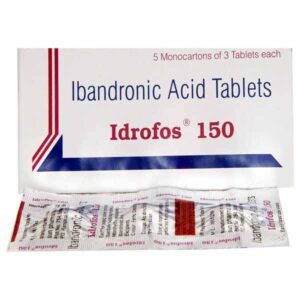IBANDRONIC ACID
IBANDRONIC ACID: Ibandronic acid is a medication primarily used for the treatment and prevention of osteoporosis in postmenopausal women. It belongs to a class of drugs called bisphosphonates, which help to increase bone density and reduce the risk of fractures.
The mechanism of action of ibandronic acid involves inhibiting the activity of osteoclasts, which are cells that break down bone tissue. By inhibiting osteoclast activity, ibandronic acid helps to slow down bone loss and increase bone mass.
The usual recommended dose of ibandronic acid for the treatment of osteoporosis is a once-monthly oral tablet of 150 mg. It is important to take the tablet on an empty stomach, with a full glass of plain water, at least 60 minutes before the first food or drink (other than water) of the day. It is important to remain upright for at least 60 minutes after taking the medication to avoid irritation of the esophagus.
Common side effects of ibandronic acid may include gastrointestinal symptoms such as nausea, diarrhea, indigestion, and abdominal pain. Some individuals may experience flu-like symptoms, back pain, headache, dizziness, or joint pain. Rare but serious side effects include severe bone, joint, or muscle pain. In very rare cases, ibandronic acid has been associated with an increased risk of osteonecrosis of the jaw and atypical fractures of the femur.
It is important to note that ibandronic acid is generally not recommended for individuals with certain health conditions, such as severe kidney problems or low blood calcium levels. It may also interact with other medications, so it is vital to inform your healthcare professional about all other medications you are taking.
As with any medication, it is important to follow the prescribed dose and consult with a healthcare professional for any concerns or questions about using ibandronic acid.


